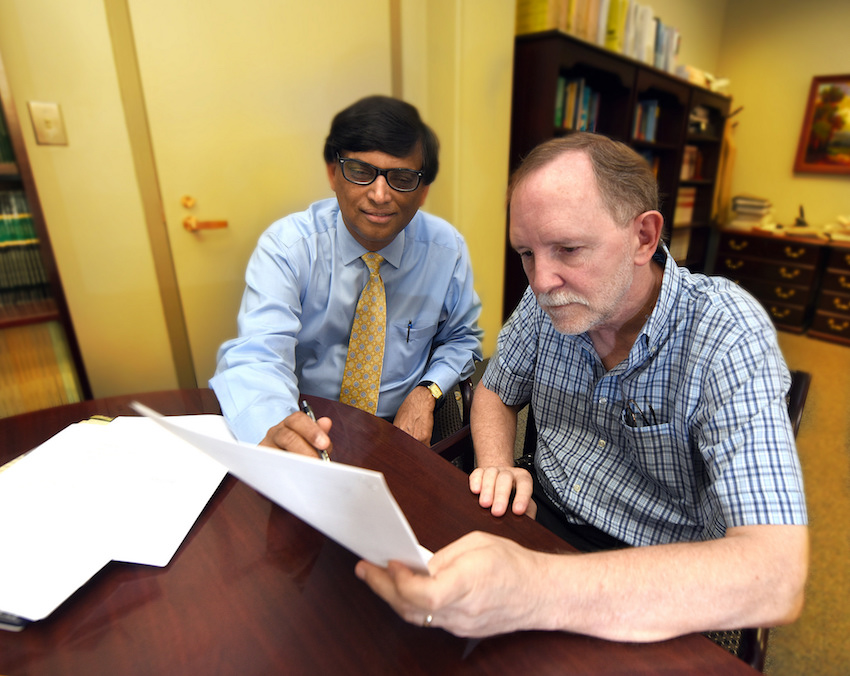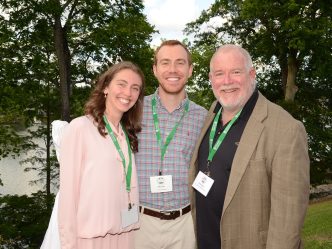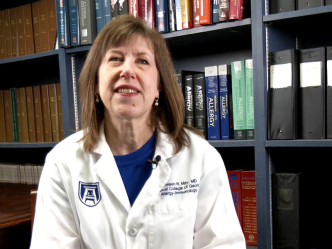Flu season is almost here. Last year, flu season in Georgia was particularly bad. There were 145 flu-related deaths and more than 3,000 hospitalizations, making it the worst outbreak in a decade.
Why was the last flu season so bad, and what does this mean for the coming flu season?
These are questions that a biostatistician can help answer.
Individuals in this field analyze and interpret data. Some statisticians examine disease epidemiology and the ways in which a disease manifests in certain populations, while others may analyze data to discern how public policies affect a community. Still others may assess the genetic predisposition of cardiovascular disease or predict how long a cancer patient is likely to survive.
“Everything is data dependent these days,” said Dr. Varghese George, chair of the Department of Population Health Sciences in the Medical College of Georgia at Augusta University. “Any scientific research in any field is supported by data and facts, whether you work in academia as a teacher and researcher, the automobile industry, a pharmaceutical company or the Food and Drug Administration. The job market for statisticians is widespread and the demand is high.”
In response to the demand, the department’s Division of Biostatistics and Data Science and the Department of Mathematics in the College of Science and Mathematics established an accelerated BS/MS degree in mathematics/biostatistics. Students will receive a Bachelor of Science in math and a Master of Science in biostatistics within five years.
The program is accepting students now and will officially kick off in the fall 2019 semester. George expects a steady stream of students from Georgia to enroll in the program and hopes to change the intimidating perception many have of math.
“This degree is about helping advance science and the general health of the population,” he said. “The bio part of biostatistics means that you can work with researchers in medicine, biology and public health to turn voluminous data into knowledge that helps improve human health.”
Carly Bryan, a 2016 graduate of the Master of Biostatics program, currently works as a statistical analysis with BlueCross BlueShield of South Carolina. Like George, she has noticed the increase in demand for biostatisticians.
“A masters in biostatistics allowed me to apply my mathematical knowledge to a career other than teaching,” she said. “Graduates from this program are so important because research in the fields of medicine, biology and public health are constantly growing. It takes a person with a true understanding of biostatistics to properly interpret the data.”
Students in the accelerated degree program will spend their first three years at Augusta University taking classes in the math department. In their fourth year, students will take their senior level math classes and take masters level biostatics courses. Finally, in the fifth and final year, students will take classes exclusively in the Department of Population Health Sciences.
In addition to the opportunity to earn both a bachelor’s and master’s degree in five years, the program also provides students with ample experiential learning opportunities.
“Biostatistics students get to work with real data as part of their coursework as well as their capstone project,” George said. “Students get the hands-on experience of looking at and analyzing data to help clinical and basic science investigators.”
These projects are important because they help students stay connected to the concepts they’re learning in class.
“We don’t just teach numbers,” George said. “We use real examples and analyze real data. If students are detached from the science, then they can’t connect with the work they’re doing. We want to make sure students get meaningful practical experience.”
For Bryan, these hands-on learning opportunities provided her with experience that gave her an advantage in her job search.
“The program was challenging but taught me to be confident in my abilities,” she said. “Consulting on projects and working on my thesis gave me a lot of experience to take with me when applying for jobs. This program really brought a sense of direction to my life, and I feel very blessed to have found it.”
Graduates of the master of biostatistics program currently have a 100 percent job placement upon graduation. Typically, they’re employed by government agencies, biotechnology companies, pharmaceutical companies or insurance companies. For more information about the program, visit the Division of Biostatistics and Data Science website.
 Augusta University
Augusta University





